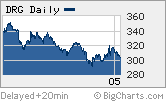 |
| A spoonful of sugar may make the medicine go down but negative headlines caused drug stocks to go down as well during the past 12 months. |
|
|
|
| * based on 2005 EPS estimates and stock prices as of 1/20/05 | | Source: Thomson/Baseline |
|
|
|
|
NEW YORK (CNN/Money) -
Pharmaceutical stocks used to be a safe haven for investors. Selling drugs was a dependable business.
That's obviously no longer the case. Health concerns surrounding Merck's Vioxx and Pfizer's Celebrex have spooked investors in these two Dow components. Shares of Pfizer (Research) have plunged 30 percent in the past 12 months while Merck (Research) has plummeted 34 percent.
Many other large drug stocks are suffering due to concerns about looming patent expirations and weak pipelines.
But with a slew of earnings reports from large drug companies due out next week, including reports from Merck, Johnson & Johnson (Research), Eli Lilly (Research), Schering-Plough (Research) and Bristol-Myers Squibb (Research), is it time for investors to be taking a look at the beleaguered sector?
So far, earnings season for big pharma is off to an unpromising start.
Pfizer reported earnings that were slightly lower than expected on Wednesday and added that it would not provide guidance for 2005 until April, citing concerns about patent expirations and "other factors." Swiss drug giant Novartis (Research) also missed estimates.
Cheap stocks and healthy dividends
Still, some fund managers say that drug stocks are starting to look tempting, as price-to-earnings ratios are at relatively low levels and dividend yields are fairly high.
"A number of drug stocks look inexpensive and for most investors, the dividend is an additional positive since it helps the returns of those stocks," said Thomas Laming, president and chief investment officer of TrendStar Advisors, an institutional firm based in Overland Park, Kansas.
Laming said the TrendStar American Endeavor fund owns a small amount of Pfizer and Merck, which now trade for just 11.6 and 12.5 times 2005 earnings respectively and have dividend yields of 3 percent and 4.9 percent.
Clearly, the Vioxx recall and the increased scrutiny on Celebrex are not to be taken lightly. Both companies will take sales hits because of the problems with these drugs. And investors are nervous about the possibility of numerous lawsuits and massive settlement payouts hurting the financials of both companies.
But Carl "Clay" Peterson, president and CEO of Parkway Advisors, a money management firm in Abilene, Texas, that is the advisor for the Memorial Value Equity fund, said that these concerns are overdone, specifically for Merck.
Peterson thinks that Merck, with about $7 billion in cash on its balance sheet, has enough cash on hand for claims and that sales of existing medications and new drugs in the pipeline will enable the company to keep building its cash position.
With that in mind, he said investors should capitalize on the discounts in the sector.
"We feel good about the drug companies. The time to buy these stocks is when they are out of favor so you can take advantage of an overreaction," said Peterson, whose fund owns shares of Merck, Bristol-Myers Squibb and Watson Pharmaceuticals (Research). He said he added to positions in all three stocks last fall after the Merck blowup.
But don't expect a miraculous recovery
Of course, investors shouldn't expect a lot from drug stocks, particularly ones like Merck and Pfizer that have been subject to negative headlines, anytime soon.
"Earnings growth has been surprisingly low for drug stocks and there is more of that to come as we go through a cycle of patent expirations," said Daniel Boone, managing partner with Atlanta Capital, which runs the Calvert Social Investment Equity fund. "But I think the stocks are close to being washed out and if you have patience they will do quite well over a longer period of time."
Boone said his fund owns shares of Pfizer and Johnson & Johnson. Laming said his fund also owns Johnson & Johnson, which has been a far more stable company, thanks in part to the fact that it is more diverse. In addition to pharmaceuticals, J&J has a big presence in the consumer healthcare product and medical devices markets.
J&J is expected to report an earnings increase of 12 percent for the fourth quarter when it releases its results on Tuesday. That's better than most of the other large cap drug stocks. Of course, this quality comes at a price though. J&J trades at 19 times 2005 earnings estimates.
But in a tumultuous time for the healthcare sector, investors seeking security might, ironically enough, want to look at more expensive stocks in the group. After all, some bargain-priced stocks can stay that way for a while.
"There's no question that drug stocks are dirt-cheap but are they going to be dirt-cheap for the next five years?" said Matt Kelmon, president of Palo Alto-based Kelmoore Investment Company. He said he owns a little bit of Wyeth (Research) and Pfizer in his funds but is wary of buying more drug stocks just yet.
Fund managers said that investors shouldn't limit themselves to traditional pharma companies either if they are interested in the healthcare sector.
To that end, Laming said one of his top picks is Sigma-Aldrich (Research), a company that makes chemicals used by drug developers. The stock trades at 18 times earnings estimates for 2005 and Laming said he likes it because it is a safer way to bet on overall growth in the pharmaceutical industry instead of trying to identify individual companies that will produce the next blockbuster drug.
And Boone said he also owns biotech Amgen (Research). Even though it trades at 22 times 2005 earnings estimates, earnings are expected to increase at a nearly 20 percent clip annually for the next five years while long-term growth rates for most large drug stocks range from the high single-digits to low teens.

|